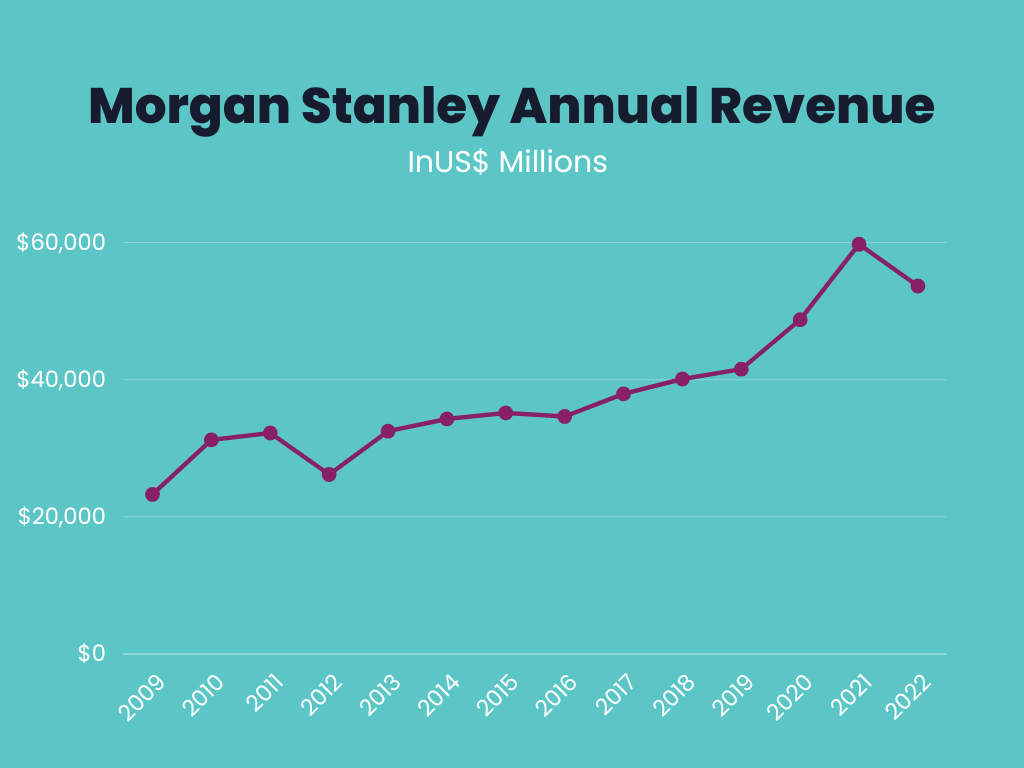

Morgan Stanley's board is set to prioritize the selection of CEO James Gorman's replacement during its upcoming meetings, according to a Reuters anonymous source. As Gorman looks to resolve major regulatory issues, the board will evaluate three internal candidates in July and subsequent meetings in September and October. Co-presidents Ted Pick (head of the International Securities Group) and Andy Saperstein (head of the Wealth Management Unit) are considered the front runners, with Pick slightly ahead. Another contender is Dan Simkowitz, the head of investment management, although no final decision has been made. The process remains confidential, and neither Morgan Stanley nor the individuals involved commented on the matter.
Under Saperstein's leadership, Morgan Stanley's wealth management division has emerged as a formidable force, managing a staggering $4.5 trillion in assets. This accomplishment has propelled the bank's market value above that of its long-standing rival, Goldman Sachs. Saperstein's remarkable success can be attributed to his role in spearheading a transformation in Wall Street's culture alongside his mentor, James Gorman. Following the 2008 financial crisis, they steered the company away from the high-risk, speculative practices prevalent at firms like Salomon Brothers.
Morgan Stanley shifted its focus toward the stable and lucrative business of wealth management, distancing itself from the wild gambles taken by risk-seeking traders. This strategic shift has not only garnered immense favor from investors but has also instilled envy among competing firms. Morgan Stanley's ability to generate consistent fees and prioritize long-term client relationships has earned the company a reputation as an industry leader.
Gorman plans to assume the role of executive chairman when the new CEO assumes control, ensuring stability during any potential disruptions in the banking sector. Before stepping down, Gorman aims to address various regulatory matters to provide a clean slate for his successor. One such matter is an investigation by the Securities and Exchange Commission and the U.S. Attorney's Office for the Southern District of New York into the bank's block trading practices. Additionally, Gorman seeks to tackle proposed international regulations that could necessitate increased capital requirements for major banks. Recent results of regulatory stress tests indicated that major banks have sufficient capital to withstand a severe economic downturn.
During his tenure, Gorman, an Australian-born executive, has transformed Morgan Stanley into a dominant force in wealth management, with aspirations to manage $10 trillion in assets. The company has actively prepared internal executives for succession over the past decade, providing an advantage over external candidates. Pick, responsible for institutional securities, and Saperstein, overseeing wealth management, are well-positioned contenders. Simkowitz, who manages investment management and corporate strategy, is also under consideration.
The selection of Gorman's successor holds significance not only for Morgan Stanley but also for the broader financial industry, which faces economic uncertainties, geopolitical tensions, and rapid technological changes. As Wall Street observes prolonged tenures of financial crisis-era leaders, attention turns to succession plans. While some CEOs like JPMorgan Chase's Jamie Dimon and Bank of America's Brian Moynihan have indicated their intention to remain in their roles, Gorman expressed confidence in passing the torch after his 14-year tenure.


Canadian stocks are on a roll in 2025 as the country prepares to name a new Prime Minister.

Two C-level leaders reveal the new time-saving tools they've implemented and what advisors are doing with their newly freed-up hours.

The RIA led by Merrill Lynch veteran John Thiel is helping its advisors take part in the growing trend toward fee-based annuities.

Driven by robust transaction activity amid market turbulence and increased focus on billion-dollar plus targets, Echelon Partners expects another all-time high in 2025.

The looming threat of federal funding cuts to state and local governments has lawmakers weighing a levy that was phased out in 1981.
RIAs face rising regulatory pressure in 2025. Forward-looking firms are responding with embedded technology, not more paperwork.
As inheritances are set to reshape client portfolios and next-gen heirs demand digital-first experiences, firms are retooling their wealth tech stacks and succession models in real time.
